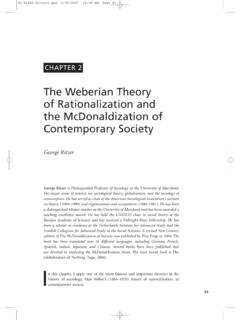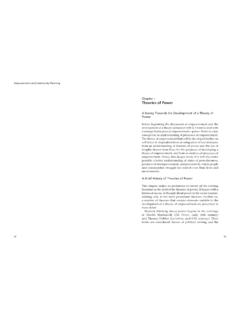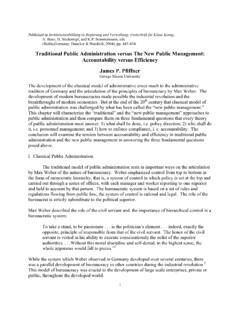Weber S Theory Of Bureaucracy
Found 11 free book(s)Bureaucratic Theory by Max Weber A Review Study
www.ignited.inWeber theory. He believed bureaucracy was the most efficient way to set up an organisation, administration and organizations. Max Weber believed it was a better than traditional structures. Below is a more detailed explanation of the 6 In a bureaucracy, everyone is treated equal and …
The Weberian Theory of Rationalization and the ...
us.corwin.comIn Weber’s view, modern society, especially the Western world, is growing increasingly rationalized. As the reader will see, Weber regarded bureaucracy as the ultimate example of rationalization. Thus, Weber can be seen as being focally concerned with the rationalization of society in general and, more specifically, its bureaucratization.
Chapter 1 Theories of Power - Elisheva Sadan's website
www.mpow.orgWeber’s bureaucratic model (Merton, 1957). The critique of Weber stemmed, unjustly, from an understanding of his theory as an idealization of the bureaucratic organization. The truth is that Weber saw the organizational power of the bureaucracy as the source of the mechanization and routinization of human life, and as a threat to the freedom of
ORGANIZATIONAL BEHAVIOR: INTEGRATING …
bayanbox.irToward a Theory of Administration: Henri Fayol (1919) 12 Bureaucracy: Max Weber (1922) 13 Mary Parker Follett’s Observations on Organizations and Management (1925) 14 The Functions of the Executive: Chester I. Barnard (1938) 16 The Hawthorne Studies (1939) 17 Theory X and Theory Y: Douglas McGregor (1960) 18 Management Guru: Peter F. Drucker ...
Overview of theories on organization and management
www.uio.noOrganization theory – a timeline Sociotechnics. 1900 . 1910 . 1920 . 1930 . 1940 1950 1960 1970 1980 1990 . 2000 . Max Weber . Theory of Bureaucracy . Frederick Taylor . Scientific Management and . Henri Fayol . Administrative theory . Luther Gulick Lyndall Urwick “Papers on the Science of Administration” Elton Mayo . Human Relations
Historical and Contemporary Theories of Management
resources.saylor.orgtheory postulates that the worker would be motivated to be more efficient and ... proposed by Max Weber, a sociologist from Germany. His approach focused on ... Managers, he stated, would be followed simply because of their elevated position. Weber viewed each organization as a bureaucracy with goals to be met at the expense of individuality or ...
UNDERSTANDING AND MANAGING ORGANIZATIONAL …
www.apexcpe.comUrwick, and Max Weber. Weber, the most prominent of the three, proposed a “bureaucratic” form of structure that he believed would work for all organizations. Although today the term bureaucracy conjures up images of paperwork, red tape, and inflexibility, Weber’s model of bureaucracy embraced logic, rationality, and efficiency.
New Public Management (NPM): A dominating paradigm in ...
academicjournals.orgbureaucracy, markets were superior in every respect, with words like ‘freedom’ or ‘choice’ (Friedman and Friedman,1980). Several theories have provided the theoretical underpinnings of NPM and have helped shape NPM ideas, in particular public choice theory, principal/agent theory and transaction cost theory
Organizational Structure and Design Abstract Introduction
files.eric.ed.govstructural frameworks: Weber’s model of bureaucracy, Likert’s system 4 organization, Bolman and Deal’s four-frame model, Mintzberg’s strategy-structure typology, Scott’s open-systems perspective, Senge’s learning organization, and Bass’s transformational leadership. In the broadest sense, the usefulness of
Introduction to Sociology
www.cartercenter.orgThe theory focuses on the structure of the society. Moreover, it emphasizes how the structure functions. To put it in an example, when a researcher studies the family the focus would be on the structure of the family. Then, the function and the effect of the structure is analyzed. Conflict Theory Karl Marx is the most known person in this theory.
Traditional Public Administration versus The New Public ...
pfiffner.gmu.eduMax Weber described the role of the civil servant and the importance of hierarchical control in a bureaucratic system: To take a stand, to be passionate . . . is the politician’s element . . . indeed, exactly the opposite, principle of responsible from that of the civil servant. The honor of the civil
Similar queries
Bureaucratic Theory by Max Weber, Weber theory, Bureaucracy, Weber, Theory, Chapter 1 Theories of Power, ORGANIZATIONAL BEHAVIOR: INTEGRATING, Overview of theories on organization and management, Theory of Bureaucracy, UNDERSTANDING AND MANAGING ORGANIZATIONAL, Of bureaucracy, Introduction to Sociology










